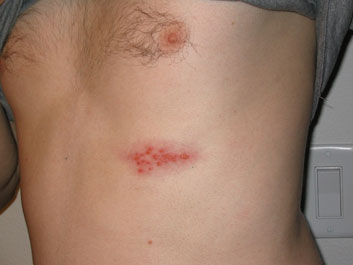Opioids For Shingles Treatment
There are millions of cases of shingles throughout the world each year and as there as there is no cure for the virus; the reliance on medications and treatments are vital to control symptoms. The benefits of opioids for shingles treatment mean that they are becoming one of the most widely used medications and are preferred to other forms of shingles drugs by many sufferers.
What is shingles?
Shingles is virus which causes infection in the nerve endings and the surrounding area of skin. It is caused by a virus known as herpes varicella-zoster which causes chickenpox and lays dormant in the nervous system as a result. When the virus is reactivated from its dormant state it causes shingles. The main cause of reactivation is a weakening of the immune system which is why shingles is common in the elderly, HIV/AIDS sufferers and anyone on medication which supresses the immune system.
The shingles virus can cause severe pain in the nerve endings and a rash of red spots will appear along the route of a nerve, these spots quickly turn to painful blisters which can last up to a week before drying out and scabbing over.
What opioids used in shingles cases?
Opioids for shingles treatment are generally prescribed when a patient is suffering from a more severe form of pain; they are a strong painkiller and are offered when mild to moderate painkillers such as paracetamol and ibuprofen are unsuccessful and relieving pain.
A common form of painkiller for shingles cases in elderly people is antidepressants; opioids are becoming an excellent alternative to this kind of medication because of the fast acting benefits of the painkiller.
GP’s prescribing opioids for shingles treatment will usually do so in the form of codeine, these are a mild form of opioid but are suitable for relieving moderate to severe pain. They are prescribed in tablet form to be taken 3-4 times per day and work by mimicking the action of endorphins which are the body’s natural pain reducing chemicals. Endorphins are found in both the brain and the spinal cord and codeine replicates the action by combining which opioid receptors in both the brain and spinal cord to block the pain signals which are sent to the spinal cord from the brain. This process dampens down the nerve senses and less pain is felt as a result.
The other form of opioid that is prescribed by a GP is morphine, although this is done so on only rare occasions. Morphine is also for cases of moderate to severe pain and can be taken as needed to remove the sensation of pain felt as a result of shingles or postherpetic neuralgia. Morphine works in a similar way to codeine and blocks the pain perception centre in the brain; it is fast acting and can only be used alongside a similar opioid such as codeine so that the body is tolerant.
Using opioids for shingles treatment can also bring about side effects such as: constipation, drowsiness, flushing, mood changes, hallucinations and headaches.

- Home
- Shingles Treatment At Home
- Shingles Treatment Faq
- Antibiotics For Shingles Treatment
- Antiviral Drugs For Shingles Treatment
- Best Treatment For Shingles
- Chickenpox Shingles
- Clinical Trials For Shingles Treatment
- Cure For Shingles
- Diagnosing Shingles Treatment
- Epilepsy Medication For Shingles Treatment
- Herpes Shingles Treatment
- Herpes Zoster Shingles
- Medical Advice For Shingles Treatment
- Opioids For Shingles Treatment
- Postherpetic Neuralgia Shingles Treatment
- Recurring Shingles Treatment
- Shingles Eye Treatment
- Shingles Holistic Treatment
- Shingles Pain Treatment
- Shingles Treatment And Children
- Shingles Treatment And Pregnancy
- Shingles Treatment Complications
- Shingles Treatment For Face
- Shingles Vaccination
- Shortening Shingles With Treatment
- Side Effects With Shingles Treatment
- Symptoms Of Shingles
- Topical Treatment For Shingles
- Treatment For Herpes Zoster Shingles
- Treatment For Postherpetic Neuralgia After Shingles
- Treatment For Shingles
- Tricyclic Antidepressants For Shingles Treatment
